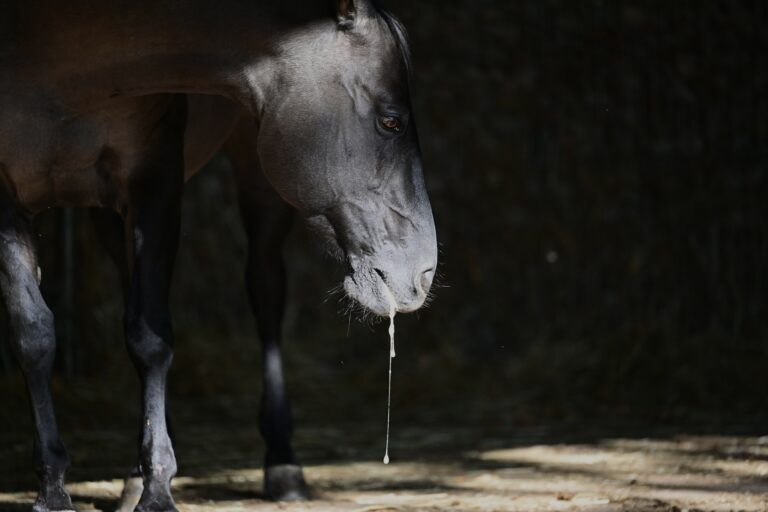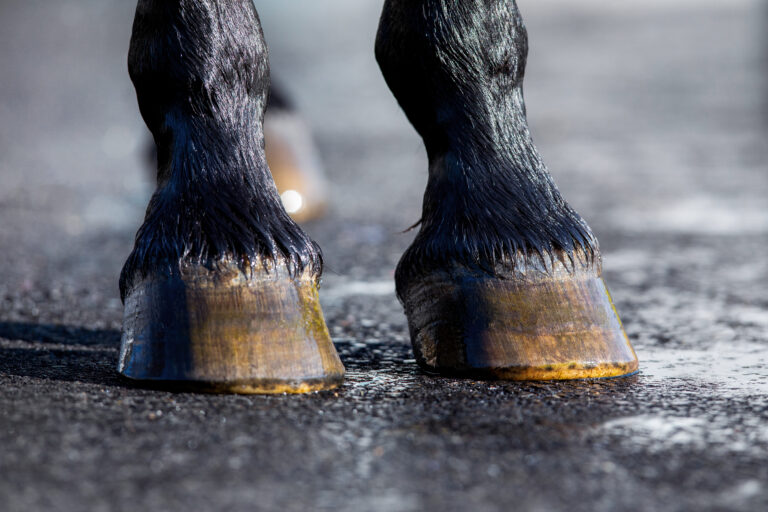
Biomarkers in equine saliva could present a new noninvasive diagnostic method for various conditions. Researchers in Spain and Denmark examined immunoglobulin levels within the saliva to determine if this method is useful for identifying horses with equine gastric ulcer syndrome (EGUS).
Potential Biomarkers for EGUS: ADA and IgA
Adenosine deaminase (ADA) and S100A8/A9 are two biomarkers involved in regulating inflammatory responses and immune system activation. Increased levels of ADA and other inflammatory biomarkers have been documented in horses with EGUS, suggesting the condition involves the immune system.
Immunoglobulin A (IgA) has specific involvement with mucosal protection and autoimmunity. Immunoglobulin G (IgG) typically increases in cases of immune-mediated or chronic disease. Both immunoglobulins are detectable in saliva—salivary IgG derives from blood while IgA is produced by salivary glands. In this study, IgG and IgA were “compared with other biomarkers of the immune systems such as ADA, S100 A8-A0, and other proteins.”
Research on EGUS Biomarkers
The researchers performed gastroscopy on 105 study horses to confirm and grade gastric ulcers. Of horses with gastric ulcers, 25 of 71 had both squamous and glandular gastric disease, 25 had EGGD only, and 21 had ESGD. Twenty horses showed clinical signs typical of EGUS but did not have identifiable lesions on gastroscopic exam. Controls included 14 healthy horses without clinical signs or lesions.
Researchers collected saliva and serum samples prior to gastroscopy that were analyzed by commercial automated assays. The results are as follows:
- Horses with EGUS had decreased IgG and IgA serum levels, possibly due to microbial dysbiosis.
- Horses with EGUS had decreased IgG in saliva. IgA concentrations increased significantly in horses with EGUS.
- Serum values did not correlate with saliva for any biomarker.
Research Findings
The researchers hypothesized that increased IgA in EGUS horses’ saliva might be associated with changes in the oral microbiota and/or the influence of stress. Salivary alpha-amylase—a marker of sympathetic activation—was also elevated in EGUS horses’ saliva. In this study, ADA, S100 A8-A0, and other proteins and biomarkers were elevated EGUS horses’ saliva compared to the non-EGUS group. Notably, IgA was also elevated in the saliva of horses with different diseases.
The authors noted that this preliminary report needs more investigation with further studies and larger study populations. Based on this study, they concluded that increased IgA levels in saliva could be a useful biomarker to screen for horses for EGUS.
Reference
Botía M, Martín-Cuervo M, Martínez-Subiela S, et al. Changes in Immunoglobulins G and A in the Saliva and Serum of Horses with Equine Gastric Ulcer Syndrome (EGUS) and Their Relationship with Other Immune and Redox Status Biomarkers. Biology 2024, 13, 891; https://doi.org/10.3390/biology13110891
Related Reading
- Activated Charcoal: Potential Treatment for Equine Gastric Ulcers?
- Feeding Horses to Guard Against Gastric Ulcer Syndrome
- Is Gastric Disease Really to Blame for Equine Behavior Issues?
Stay in the know! Sign up for EquiManagement’s FREE weekly newsletters to get the latest equine research, disease alerts, and vet practice updates delivered straight to your inbox.

![[Aggregator] Downloaded image for imported item #18890](https://s3.amazonaws.com/wp-s3-equimanagement.com/wp-content/uploads/2025/11/17113845/EDCC-Unbranded-3-scaled-1-768x512.jpeg)


